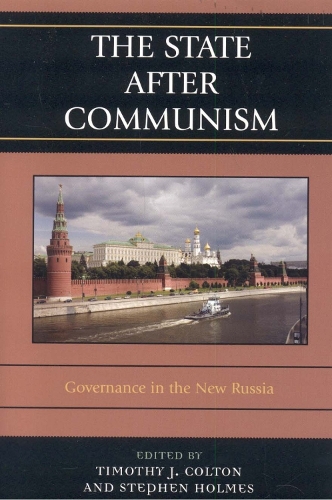
The State after Communism: Governance in the New Russia
(Paperback)
Publishing Details
The State after Communism: Governance in the New Russia
By (Author) Timothy J. Colton
Contributions by Linda J. Cook
Contributions by Gerald M. Easter
Contributions by Timothy Frye
Contributions by Yoshiko M. Herrera
Contributions by Stephen Holmes
Contributions by Pauline Jones Luong
Contributions by Thomas F. Remington
Contributions by Kathryn Stoner-Weiss
Contributions by Daniel Treisman
Bloomsbury Publishing PLC
Rowman & Littlefield Publishers
11th August 2006
United States
Classifications
Tertiary Education
Non Fiction
320.947
Physical Properties
Paperback
334
Width 153mm, Height 229mm, Spine 24mm
508g
Description
The Soviet dictatorship was a strong state, committed to dominating and transforming society in the name of a utopian ideology. When the communist regime crumbled and the post-Soviet countries committed to democracy, most observers took for granted that their state structures would be effective agents of the popular will. Russia's experience demonstrates that this assumption was overly optimistic. This book, based on a major collaborative research project with American and Russian scholars, shows that state capacity, strength, and coherence were highly problematic after communism, which had major consequences for particular functions of government and for the entire process of regime change. Eleven respected contributors examine governance in post-Soviet Russia in comparative context, investigating the roots, characteristics, and consequences of the crisis as a whole and its manifestations in the specific realms of tax collection, statistics, federalism, social policy, regulation of the banks, currency exchange, energy policy, and parliamentary oversight of the bureaucracy.
Reviews
An interesting, challenging book. Highly recommended. * Choice Reviews *
The State After Communism is a laudable effort to understand this pehnomenon, aiming to correct the earlier neglect and to "bring the state back in" to scholarly analyses of contemporary Russia....an insightful, useful set of studies on the emerging Russian state. * Canadian Slavonic Papers *
This book offers a long-awaited and much-needed assessment of the current condition of the Russian state from a distinguished group of leading American scholars of Russian affairs. The volume of essays will be required reading for any serious student of Russia who wants to understand the complexities of how the country is governed today, years after the collapse of the Soviet Union, and to get a sense of the direction of the Russian state in the future. -- Fiona Hill, The Brookings Institution
Author Bio
Timothy J. Colton is professor of government and Russian studies and director of the Davis Center for Russian and Eurasian Studies at Harvard University. Stephen Holmes is professor of law at New York University School of Law.
